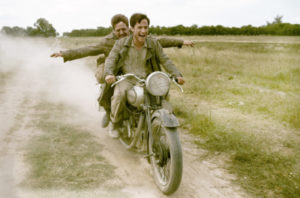
As we move into the fall, let’s move on to some fiction! And, of course, a bit more baseball, since there’s still more baseball to be played. I hope you enjoy this month’s list. And, as always, let me know what you’ve been reading!
Che Guevara – The Motorcycle Diaries
So, I actually read this in June, making it more of a summer reading entry. But I had forgotten to include it on my lists until now. I also watched the movie around the same time.
Both the book and the movie are interesting travel diaries of a young man who decided to visit most of South America on a 6 month motorcycle ride with a friend. He uses the trip to learn more about his place of origin and to grow as a person. That he turned out to be a Cuban revolutionary figure in another 6 years is almost beside the point. It still would’ve been a great story had anyone else written it.
Che gives us a unique insight into the people and places of Argentina, Chile, Peru, Colombia, and Venezuela. He especially provides insight into the status of Native Americans and people suffering from illness. If nothing else, read it for all that.
Sequoia Nagamatsu – How High We Go in the Dark
In what I suspect will be a popular literary genre in the next decade or so, Nagamatsu writes a series of stories about a pandemic. In Nagamatsu’s pandemic, climate change unleashes a mysterious virus in the Siberian tundra. And the stories of this book tell how humanity deals with the virus over a period of years.
Rather than keep a single narrative thread, Nagamatsu tells a series of mildly interrelated stories. Each story around 15 or 20 pages or so. The stories move from the original discovery of the virus to social issues in a world hit hard by the virus to a mission to find another home for humanity.
I think what impresses me the most is how much character development and feeling Nagamatsu can get from such brief stories.
Marisha Pessl – Special Topics in Calamity Physics
This was the author’s first novel – published about 15 years ago. The plot covers quite a bit, and it relies on a few closely linked mysteries. And so, saying much about it would come as an unwelcome spoiler. But the quick version is that the main character is a high school senior who has spent years moving from small town to small town with her father, a visiting college professor and well-known academic. As she grows into an adult, she faces the death of two people close to her. The first death – her mother – happened when she was a child. And the second – a teacher at her school – happened during her senior year.
Reviewers of the book generally agree that the book has a sprawling plot and format. Most loved it, and some didn’t. I’m somewhere in the middle on that question. I think the book takes a long time to get to its point and wrap up its mysteries. So, I tend to see this as a great 300 page novel contained within a 500+ page novel. In short, it’s a great story that could’ve used an editor. Especially in the middle chapters.
Christopher J. Phillips – Scouting and Scoring
So, I’ve hit a flurry of baseball reading over the course of the 2022 season. This one surprised me, in the sense that it’s an academic text written from a science and technology studies perspective! As some readers might know, I’m familiar with STS work and approaches!
Anyway, Phillips examines the common historical view that official baseball scorers (i.e., the people who fill out the scoresheets for the game) and baseball scouts (i.e., the people who evaluate prospects) represent diametrically opposed perspectives – the former a perspective of objective data and the latter a perspective of subjective ‘feel’ about a player. He effectively undermines this view.
Phillips points out that scoring a baseball game involves all sorts of ‘subjective’ decisions. Among other things, scorers must decide when a fielder really commits an error. And it took decades to settle exactly which stats are important ones that should be preserved. He then points out that scouts use lots of (potentially) ‘objective’ numbers when they evaluate players.
In both scoring and scouting, Phillips sees repeated attempts to turn contingent decisions into ‘knowledge.’ He seems lots and lots of crossovers in that regard between baseball and the human sciences.
This book is well worth a read both for baseball fans and STS folks!
Adrian Tchaikovsky – Shards of Earth
This is the first book in Tchaikovsky’s space opera Final Architecture trilogy. The basic premise? Earth has colonized a number of star systems and interacts – mostly peacefully, though not without conflict – with a number of alien species. However, one day a mysterious, advanced society comes along and destroys Earth. The human colonies must figure out how to survive.
Shards of Earth introduces the fictional universe and its major characters. The book focuses on a single ship and its crew, composed of multiple species and also multiple factions of humanity. The book tells a compelling adventure story along with introducing its universe. Humans have – and survive! – another encounter with the Architects (the major enemy that had destroyed Earth earlier).